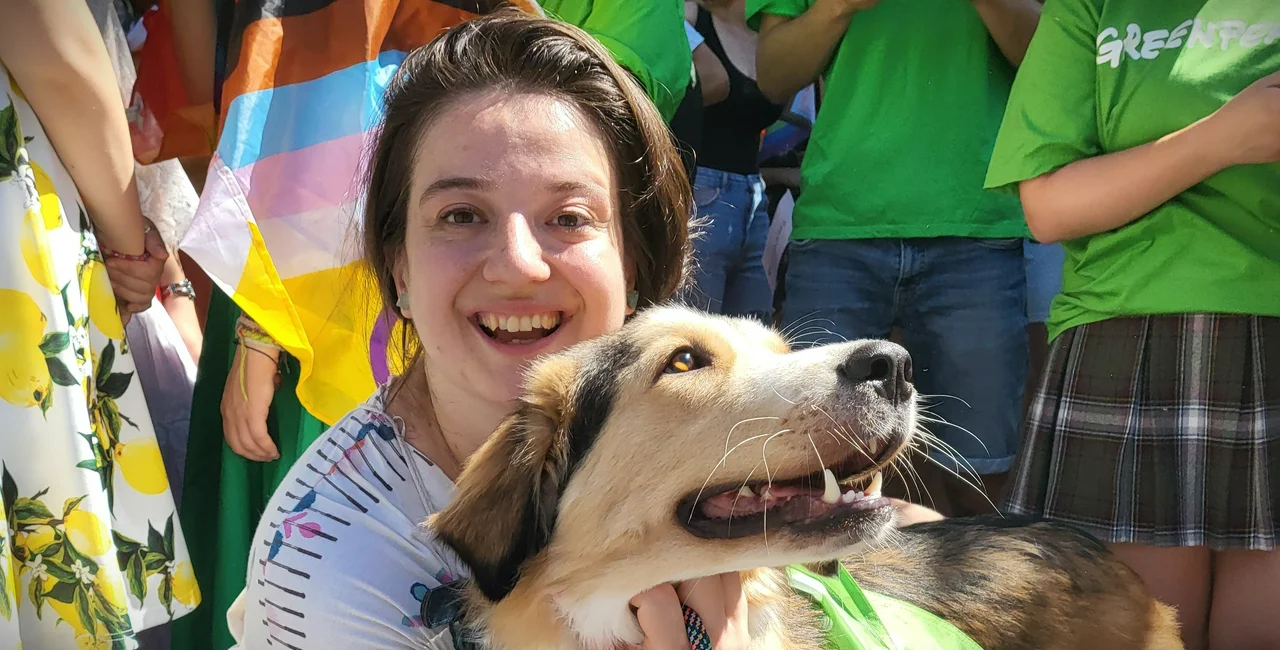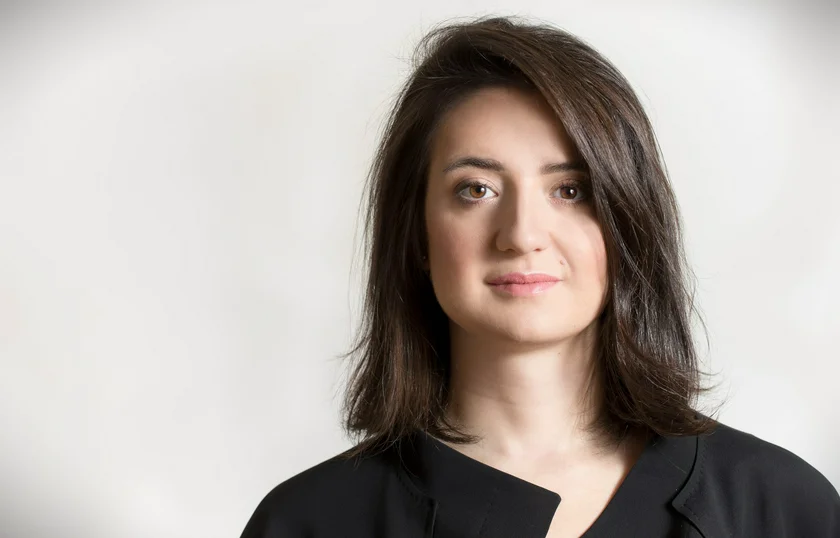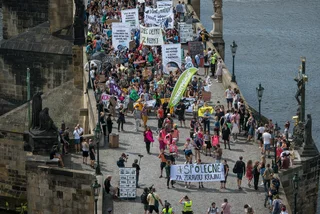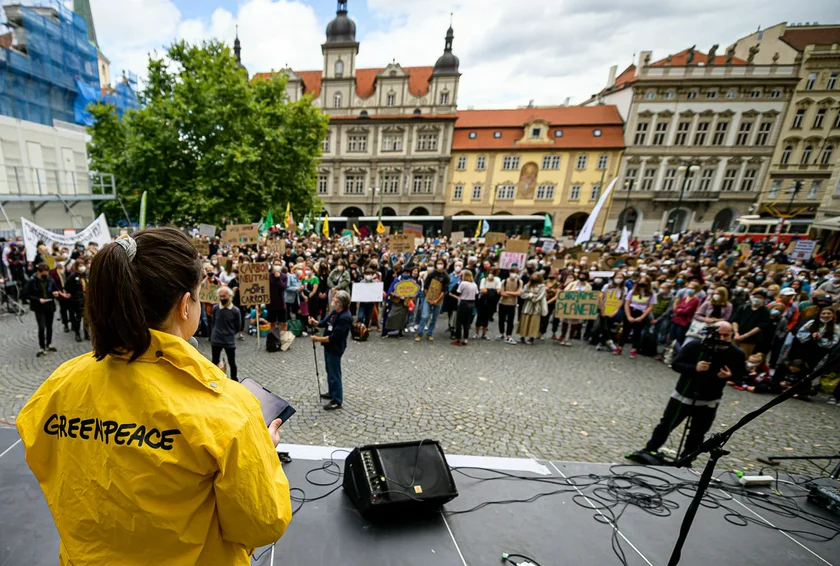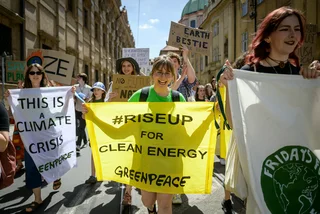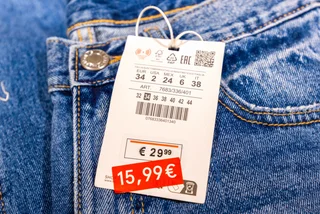There’s no doubt about it: Czechs love nature. And no wonder, as Czechia is filled with stunning natural landscapes, including ancient forests and impressive mountain ranges, that are teeming with life.
This natural beauty needs protecting, however. Human activity damages landscapes and poses a major threat to biodiversity. At the same time, like other countries around the world, Czechia is in the midst of a sweeping energy transformation to protect the global environment in response to climate change.
Campaigning organization Greenpeace plays a key role in environmental protection the world over, with a local branch focusing on developments in Czechia. By monitoring the protection of natural landscapes while examining Czechia’s steps towards energy transformation, the organization holds Czech decision-makers to account.
Expats.cz sat down with Greenpeace Czech Republic’s outgoing Executive Director, Zahide Tuğba Şenterzi, to find out more about Greenpeace’s local activities and priorities, and to gain insights into the nation’s environmental progress.
Can you give us an overview of Greenpeace’s major recent activities and initiatives in Czechia?
Greenpeace Czech Republic covers a variety of topics, focusing on climate change and biodiversity loss. Current projects look at energy efficiency, development of renewables, and discrediting the social license of fossil fuel corporations, including their growing involvement in “greenwashing” attempts.
We have also been active in pushing the implementation of ambitious European climate policies within Czech legislation, such as the policy for climate protection, the state energy concept, and the national energy and climate policy.
We recently had a big campaign on ocean protection. Even though Czechia has no access to oceans, this is still an important topic since Czechia can cast its vote as a member of the United Nations and the high seas belong to all mankind. Last year, the global Convention on the High Seas was agreed, which stipulates that by 2030, 30 percent of the high seas should be covered by marine reserves. For this to happen, 60 countries will need to ratify the agreement as soon as possible, and we are working to ensure that Czechia is one of them.
In connection with biodiversity, we deal with nature restoration laws. But the most visible topic in recent times has been old-growth forests and their protection. Another topic that connects our climate and biodiversity work is deep-sea mining.
During my time with Greenpeace, I have tried to focus on the root causes of these topics. The aim for Greenpeace in the coming years will be to take a non-binary approach, connecting up these streams of activities.
How will this help?
We need to understand that these problems are not separate – they are connected. Climate change and its impact around the world has an impact on people and their human rights. Likewise, climate change and fossil fuel mining have an impact on nature and biodiversity.
On the other hand, it’s more difficult to communicate these topics in a complex way, because people in our fast-paced society want more simplified communication. This is a challenge, but tackling root causes and systemic problems is the only way to solve these issues in the long-run.
Can you explain Greenpeace’s actions in forest protection in Czechia?
Old-growth forests are of unique importance for overcoming climate and biodiversity crises, so it’s all interconnected, as I just described.
Nine percent of all forests in this country are older than 120 years, so are already old-growth and have high conservation value, or at least have the potential to become old-growth forests. Half of these are owned by the state.
We have to protect forests because they are a hotspot of biodiversity and they capture carbon dioxide. Unfortunately, despite EU efforts, old forests continue to be logged in Czechia.
We are mainly focused on protecting and limiting logging in these state-owned forests. We are in close contact with the Ministry of Agriculture and the state forestry company urging them to stop logging in these areas. We organized a petition signed by 30,000 people, and held some protests in front of the Ministry building and Czech State Forests headquarters.
We warned about illegal cutting of the Ore Mountains, tracking wood logged from those forests and finding that it was mostly used as firewood or as raw material for single-use paper products. This is the least sustainable way to use this kind of wood coming from old and rare trees.
How would you assess Czechia’s shift away from fossil fuels?
We welcomed the government’s commitment to a coal phase-out by 2033; a commitment which was reflected in the Czech national energy and climate plan. The government has set a strategic goal to reduce the share of fossil fuels in primary energy consumption by 50 percent by 2030 and to zero by 2050, and to completely phase out the use of coal for electricity generation and heating by 2033. These commitments are appreciated.
On the other hand, we see efforts to extend mining at the Bílina coal mine in the north of Bohemia, belonging to the ČEZ Group, in which the state holds 70 percent of the shares. They have applied for an extension until at least 2035.
Having coal phase-out until 2033 and extending mining coal until 2035 doesn’t make sense. The government’s commitments should be in alignment with its concrete steps, and we don’t see this yet.
Has the shift away from Russian fossil fuels helped or hindered the green energy transition?
The shift following the Russian invasion of Ukraine has been primarily to get fossil fuels from other countries, which is not in line with a fossil fuel phase-out. On the other hand, it has also been an impetus for energy transition and energy savings, and the development of renewable resources, especially solar energy.
There are two sides to the coin. Our dependence on fossil fuels remains the same regardless of whether we get gas from Russia or other countries. The development of renewable resources, meanwhile, is not as fast as possible, and current investments are not sufficient to reach our goals.
Is environmental legislation for Czechia mostly set at the EU level, and is that where much of your activities are directed?
Czechs have historically belonged to the less ambitious and less progressive EU countries when it comes to environmental policy. That’s why we rely on progressive EU-level decisions, which set the bar higher than we would be able to get from the local Czech government.
We monitor Czechia’s implementation through EU evaluations; for example, there was an assessment of the Czech implementation plan for EU policies within the Fit for 55 packages, which aim to reduce greenhouse gas emissions by 55 percent by 2030. The European Commission concluded that Czechia’s contribution to the EU goal is insufficient.
How would you assess the outcome of COP28, which took place in late 2023?
Leaving aside the issue of where COP28 was held and who the president was, almost 200 countries agreed to transition away from fossil fuels in energy systems and to achieve net-zero by 2050. This is a great agreement, meaning countries finally agreed that we cannot rely on fossil fuels, and that we need to develop and invest more in renewable energy sources.
However, there are still loopholes and gaps creating space for false solutions that we need to be aware of, such as reliance on unproven carbon capture and storage technologies, as well as nuclear power or transitional fuels, which are essentially fossil gas.
You mentioned “greenwashing” at the start of this interview; could you explain how you would define this term in the context of businesses pursuing climate-friendly actions?
I think it’s a fine line, but sincerity is important. If a business has a CRS or ESG plans based on reducing its carbon footprint, but instead of reducing its footprint it just offsets emissions by planting trees, it’s questionable. This isn’t really solving the issue.
Sometimes, there are commitments, but no plans or actions behind them. On the other hand, some companies are doing it properly. For instance, a production company might change its manufacturing processes to use solely renewable energy. This cannot be called “greenwashing”. Offsetting, on the other hand, is greenwashing in my book, if there are no real steps that are directing change.
Czechs come across as very respectful of the environment when it comes to issues such as recycling and conservation. Would you agree?
I think Czechs love nature. In comparison with other cultures, such as Turkey, where I’m from, they have very good knowledge of ecosystems. If you’ve been to the forest with Czech people, you’ll have been amazed by their knowledge of the trees, the birds, and, of course, the mushrooms!
On the other hand, I don’t think there’s a great understanding of complex environmental issues, including the global context and how it’s interlinked. We cannot solve climate change solely through recycling. Here, I think there is still space to understand better.
What do you think should be the biggest priorities when it comes to educating the public about environmental issues?
Greenpeace Czech Republic has an educational program, and we have a group of volunteers, “Greenspeakers”, who go to schools and work with children and young people. They run various activities such as lectures and workshops, explaining how people can contribute to the protection of nature.
For me, the most important thing is to imbue Czech society and culture with the idea of active citizenship, igniting people’s interest in the environment in which they live. We then need to show people how they can become active and develop their environment.
Then, we need to underline the link between their neighborhood and the global level. For example, burning coal in Czechia will contribute to the rising of average temperatures and the worsening of climate change, with the first impacts to be seen on the other side of the world, in the form of destroyed livelihoods of indigenous peoples.
Have the economic shocks of recent years led to more opposition to your activities?
The sense of emergency is key. We feel that the climate change emergency is here right now, but human beings are inclined to differentiate between emergencies generally, and emergencies that happen to people. Even though there has been an economic downturn and the costs of living have become higher, when people saw others in need, Czech society proved that it is there to help.
Greenpeace’s donations are increasing, but economic crises have an impact on us. People are supporting with more one-off donations instead of regular contributions, which made some impact on planning and forecasting.
We are not competing in pain, but Greenpeace would say that the climate crisis is also very urgent, even though in the recent context it was put aside to some extent by society.
As an organization relying on public support, have you been able to continue with all planned activities despite the greater financial pressures faced by the public?
We didn’t have to cancel any activities or change our plans due to finances. Still, Greenpeace is reliant solely on individual fundraising and donors, without funds from business or politically affiliated entities. It’s getting more difficult, even though Greenpeace Czech Republic is still growing.
On the other hand, our number of volunteers increased. There is a wide range of volunteers, including an English-speaking volunteer group for expats and foreign students. There’s a total of around 700 volunteers, and around 100 English-speaking volunteers. The English-speaking volunteer group takes part in demonstrations and also organizes film screenings and other activities.
Volunteers are encouraged to work on their own actions, too. The volunteer program is about giving tools to people so that they can work on their own campaigns, making them change-agents in their society without having to rely on Greenpeace.
Can you tell us about your personal story and how you came to lead Greenpeace Czech Republic?
I grew up as a foreigner in a very conservative society, and I needed to fight for myself. I’m from Turkey, and in Europe, there are different views on people coming from the eastern part of the world. This made me interested in human rights issues. My parents worked for the Turkish Foreign Ministry, so I grew up around people affiliated to politics and diplomacy, which influenced the early years of my career.
I volunteered for human rights NGOs while working for the Ministry of Foreign Affairs of the Czech Republic and interpreting for the Turkish Foreign Ministry. But the world of international affairs has a very slow pace, from my perspective, and I wanted to bring about change, so I joined the Turkish Grand National Assembly as a political advisor, working in the field of children’s rights and European harmonization.
However, when I realized that changes to legislation have a limited impact if the execution fails, I decided to make a change. I went into the international corporate environment, where I spent seven years, coming to Czechia with a corporation in 2013. My somewhat anthropocentric worldview changed into a more complex, interconnected worldview during this time, as I took a break from the emotionally difficult topics which I had worked on previously.
At the end of those seven years, I felt I could return to the NGO world to contribute to society and the world we live in. I realized that my values and worldview correspond with Greenpeace’s values, and this was when I joined Greenpeace Czech Republic.
Do you leave Greenpeace with a feeling that you have achieved what you hoped for?
I believe each leader or team member has their contribution to society and their community. I had the opportunity to set our plans and to play a part in fulfilling our goals over the past almost four years; we have had some great success stories through our impact on environmental protection and slowing climate change. At the same time, we achieved organizational development from within. But this isn’t just my work; it’s the shared work of the whole team.
Each person should drive the organization to a certain point and then give space to other leaders and contributors who can drive it even further. It’s a bit like childbirth: a child comes into the world, and then it’s about how you nurture it and grow within the community. For this, Greenpeace Czech Republic now needs fresh thoughts, opinions, and fresh drive.
Did you always have a particular passion for nature and the environment?
It stems from my grandmother and my aunt, who raised me with love and respect for all sentient beings. I remember how my grandmother would feed ants that came to our house! She would explain that they are also fighting for their survival. Her home was a shelter for all living beings, she talked to her plants every evening. She was aware that she was part of nature.
Sometimes we forget this. This wisdom, gentleness and warmth resonates with me until today, and will live with me my whole life.
This article was written in cooperation with Greenpeace Česká republika, z.s. Read more about our partner content policies here.












 Reading time: 11 minutes
Reading time: 11 minutes 